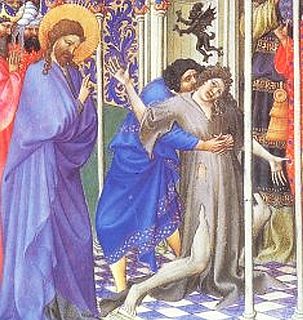 W
WExorcism is the religious or spiritual practice of evicting demons, jinns, or other spiritual entities from a person, or an area, that is believed to be possessed. Depending on the spiritual beliefs of the exorcist, this may be done by causing the entity to swear an oath, performing an elaborate ritual, or simply by commanding it to depart in the name of a higher power. The practice is ancient and part of the belief system of many cultures and religions.
 W
WThe Critical Eye is a Discovery Science Channel documentary series examining pseudoscientific and paranormal phenomena. The eight-part documentary series aired from October 2002 through February 2003 and was hosted by actor and scientific skeptic William B. Davis.
 W
WThe Durin-gut, also called the Michin-gut and the Chuneun-gut, is the healing ceremony for mental illnesses in the Korean shamanism of southern Jeju Island. While commonly held as late as the 1980s, it has now become very rare due to the introduction of modern psychiatry.
 W
WThe fangxiangshi 方相氏 was a Chinese ritual exorcist, the meaning of whose name is obscure but has been translated as "one who sees in all (four) directions", "he who scrutinizes for evil in many directions", and "one who orients unwanted spirits in the direction to which they belong". Ancient Chinese texts record that he wore a bearskin with four golden eyes, and carried a lance and shield to expel malevolent spirits. His primary duties were orchestrating the seasonal Nuo ritual to chase out disease-causing demons from houses and buildings, and leading a funeral procession to exorcize corpse-eating wangliang spirits away from a burial chamber. From the Han dynasty through the Tang dynasty, fangxiangshi were official wu-shaman specialists in the imperially sanctioned Chinese state religion; after the Tang, they were adapted into popular folk religion and symbolized by wearing a four-eyed mask.
 W
WMichael James Harner was an anthropologist, educator and author. His 1980 book, The Way of the Shaman: a Guide to Power and Healing, has been foundational in the development and popularization of Core Shamanism as a path of personal development for adherents of neoshamanism. He also founded the Foundation for Shamanic Studies.
 W
WSpirit possession is an unusual or altered state of consciousness and associated behaviors purportedly caused by the control of a human body by spirits, ghosts, demons, or gods. The concept of spirit possession exists in many cultures and religions, including Buddhism, Christianity, Haitian Vodou, Hinduism, Islam, Wicca, and Southeast Asian and African traditions. Depending on the cultural context in which it is found, possession may be considered voluntary or involuntary and may be considered to have beneficial or detrimental effects on the host.
 W
WIn English translations of the Bible, unclean spirit is a common rendering of Greek pneuma akatharton, which in its single occurrence in the Septuagint translates Hebrew ruaḥ tum'ah.
 W
WIn the cultures of the Horn of Africa and adjacent regions of the Middle East, Zār is the term for a demon or spirit assumed to possess individuals, mostly women, and to cause discomfort or illness. The so-called zār ritual or zār cult is the practice of exorcising such spirits from the possessed individual.